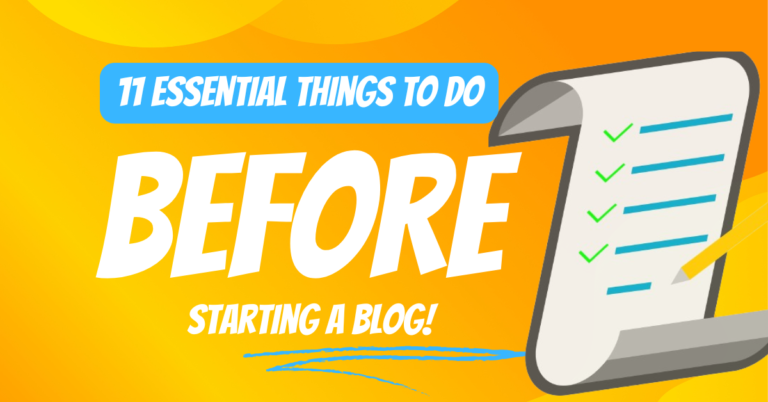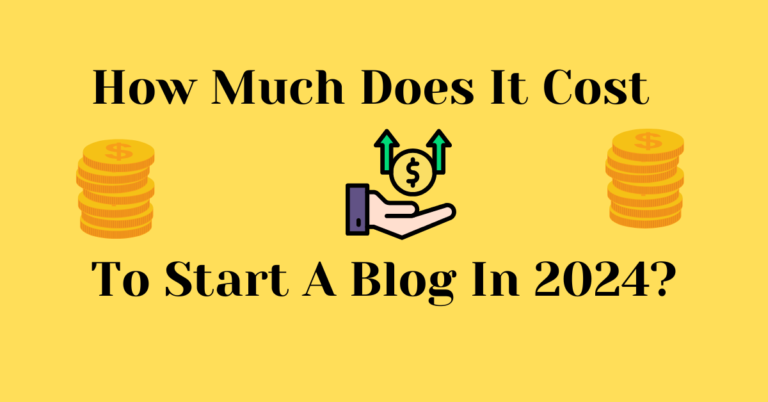Choosing a profitable blog niche is the most crucial step for any aspiring blogger looking to succeed. You’ll struggle to make Money from your blog if you select a niche with little commercial value—like chess.
On the other hand, entering a highly competitive niche like health or finance can be a viable option with the proper expertise. This expertise can make it easier to rank on Google, especially after the 2018 Medic update, and stand out in a crowded market.
I remember when I first started my blogging journey. Sitting in my tiny apartment with my laptop, I was overwhelmed by the sheer number of blog niche ideas.
Should I write about personal finance or delve into healthy eating?
The fear of picking the wrong niche was very real. But guess what? I took a leap of faith, which paid off in ways I couldn’t have imagined.
I started a lifestyle blog, sharing tips on minimalism and sustainable living—two things I was deeply passionate about. Fast forward to today, and my blog has grown into a thriving community of readers who share my passion for living sustainably.
I’ve learned that choosing the right niche doesn’t have to be daunting. It’s about finding something you love and can write about consistently.
So, whether you’re considering a gaming blog, a DIY craft blog, or something unique, remember your passion will guide you, and your audience will follow.
If you want to start a blog, let me share my experience with what I took out when picking a profitable niche.
Let’s Go-
Contents
- 1 Understanding Profitability and Passion in Choosing a Profitable Blog Niche
- 2 Broad Niches vs. Micro Niches: Which Blog Niches Make the Most Money?
- 3 The Importance of Choosing the Right Niche
- 4 What is the Most Profitable Blog Niche?
- 5 Blog Niches That Make Money: What to Consider
- 6 How to Choose the Best Niche for Blogging
- 7 How to Find a Profitable Blog Niche in 2024
- 8 Final Thoughts: How to Choose a Profitable Blog Niche in 2024
Understanding Profitability and Passion in Choosing a Profitable Blog Niche
You’ve probably heard this advice: “Start a blog based on your passion!” While passion is essential to fuel your motivation, especially when you still need to earn, it’s also important to consider the profitability of your niche.
What if, after 4-5 years, your blog still needs to generate significant income? Would your passion alone keep you going? Maybe not. That’s why it’s okay to prioritize financial potential alongside your interests when choosing a profitable blog niche.
The key is not just passion, but also profitability. You want to choose a niche that interests you but also offers financial returns over time. It’s not about sacrificing one for the other, but finding the sweet spot where your passion and your bank account both benefit.
If you don’t want to avoid entering a niche you hate, you will soon find yourself procrastinating and quiet.
It would help to view your blog more like a business than a passion. Of course, you need some interest in that niche, but profitability should be a factor in choosing a blog niche.
You want to start something substantial on your own and eventually scale up in a way that doesn’t require little effort.
And it all starts with finding the right niche.
Broad Niches vs. Micro Niches: Which Blog Niches Make the Most Money?
When selecting a blog niche, you’ll encounter two main types: broad niches and micro niches.
Broad Niches
A broad niche is a large umbrella category that covers a wide array of subtopics.
There are four big industries. We have Money, health, leisure & relationships.
The money industry has broad niches such as personal finance, money markets, business, economics, etc.
The health industry has broad niches such as biotechnology, health insurance, alternative medicine, wellness, etc.
Micro Niches
A micro niche is a narrower subtopic within a broader niche.
For example, within personal finance, micro niches could include credit cards, budgeting, or even specific sub-topics like student loans or home loans.
Broad or Micro: which one should I target
In 2024, starting with a micro niche is often a better strategy, especially for new bloggers.
So, to start with, you target micro niches. Pick one of the narrower micro-niches and extend your niche when the site grows.
Start a micro niche because it is easier to understand Google and other search engines and what your site is. As you focus on a narrower niche, you are helping a specific group of people. Hence, you can address questions that big sites don’t usually discuss.
Learn More>> Broad or Micro: which one should I target?
The Importance of Choosing the Right Niche
Choosing the right blog niche is crucial for your success. Your niche determines your audience, your content, and your potential income.
It’s like planting a tree: you need the right seed, the right soil, and the right conditions for it to grow. Similarly, your blog needs a niche that matches your interests, has market demand, and offers monetization potential.
What is the Most Profitable Blog Niche?
When considering starting a blog, one of the most important questions is, “What is the most profitable blog niche?”
A profitable niche typically has high market demand, low-to-moderate competition, and multiple monetization opportunities. Niches consistently generate significant revenue and often cater to essential needs or desires like health, wealth, or relationships.
For example, finance, health, and technology are consistently among the most profitable niches. However, certain sub-niches can be even more lucrative within these broad categories.
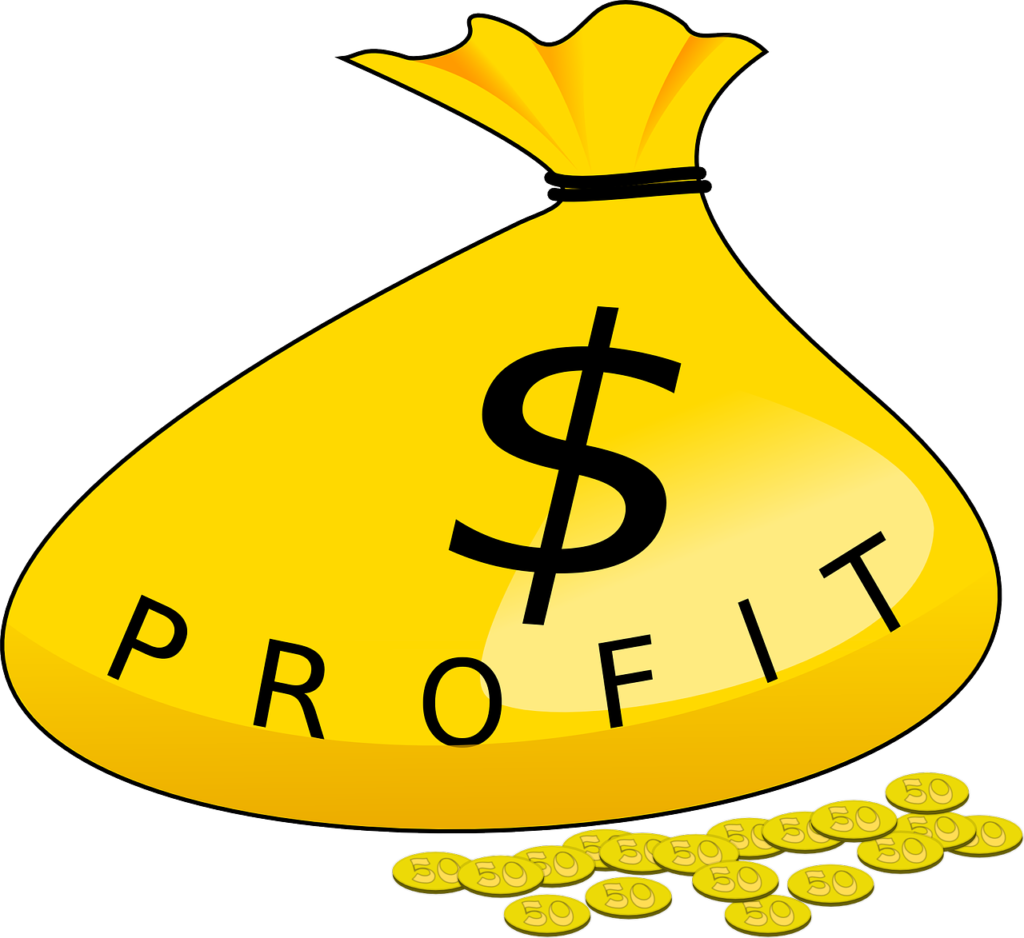
In 2024, some of the most profitable blog niches include:
- Personal Finance and Investment: With growing interest in financial independence and investment strategies, this niche continues to attract a large audience.
- Health and Wellness: Niches focusing on specific health concerns, such as mental health, fitness, or alternative medicine, are particularly profitable.
- Technology and Gadgets: As technology evolves, niches like AI tools, smart home devices, and tech reviews remain profitable.
Choosing a niche from one of these categories can increase your chances of success, but it’s important to consider your interests and expertise to ensure long-term sustainability.
Blog Niches That Make Money: What to Consider
When it comes to blogging, some niches are more lucrative than others. Understanding what makes certain niches profitable can help you make a more informed decision when choosing your own.
Here are some examples of blog niches that make Money and the key factors that contribute to their profitability:
- Personal Finance: This niche is highly profitable due to its broad appeal and the numerous products and services available for promotion, such as credit cards, loans, and investment tools.
- Health and Fitness: With a continuous focus on well-being, blogs that offer advice on diet, exercise, and mental health attract a dedicated audience willing to invest in their health.
- Technology and Gadgets: Technology is always evolving, and blogs that review the latest gadgets, provide tech news or offer troubleshooting tips can generate significant affiliate income.
- Lifestyle: Lifestyle blogs that focus on specific sub-niches, like minimalism, sustainable living, or luxury travel, can be very profitable due to their targeted audiences and the variety of monetization options available.
When considering a niche, consider the audience’s purchasing power, the availability of affiliate programs, and the potential for creating digital or physical products. A niche that combines high demand with multiple revenue streams is more likely to be profitable.
How to Choose the Best Niche for Blogging
Choosing the best blogging niche involves more than just picking a topic you enjoy. Consider several factors to ensure your blog is successful and profitable. Here are some steps to help you choose the best blogging niche:
- Market Research: Start by researching the market demand for your niche ideas. Use tools like Google Trends, Ahrefs, or SEMrush to identify search volume and interest over time. A niche with consistent or growing demand is a good sign.
- Audience Needs: Consider what problems or needs your potential audience has. The best niches often solve specific issues for a clearly defined audience. For example, a blog providing budgeting tips for single mothers targets a particular need.
- Competition Analysis: Analyze the competition within your niche. While some competition is a good sign that the niche is profitable, too much competition, especially from well-established sites, can make it difficult for a new blog to rank and attract readers.
- Monetization Potential: Consider how you will monetize your blog. Some niches have more monetization opportunities, such as affiliate marketing, selling digital products, or offering services. Ensure there are enough revenue streams available for your chosen niche.
By carefully evaluating these factors, you can choose a niche that is aligned with your interests and profitable in the long run.
How to Find a Profitable Blog Niche in 2024
Finding the right profitable blog niche involves two main steps:
Step One: Brainstorm Niche Ideas
Start by brainstorming all possible niche ideas. Think about your interests, professional experience, and hobbies.
Step Two: Niche Validation
Once you’ve gathered some niche ideas, it’s time to validate them. You want to ensure your chosen niche has enough market demand, manageable competition, and multiple monetization opportunities.
Step one: Discovering Niches
There is no lack of niche recommendations on the internet. If you google ‘profitable blog niches,’ you will have tons of blog niche ideas. Go to YouTube and search for the same ‘profitable blog niches.’ I am sure you will get many suggestions.
Those niches that people recommend are probably profitable, but they might also be highly competitive.
Should you choose a highly competitive niche as a beginner?
Short answer: Generally, no.
While it might seem tempting to dive into a highly competitive niche because of its potential rewards, it’s often a challenging path for beginners. Here’s why:
Steep Learning Curve: Established players with significant resources and expertise dominate highly competitive niches. Competing with them without a solid foundation in SEO, content marketing, and digital strategy can be overwhelming.
Slow Growth: Breaking into a competitive niche takes time, effort, and often a substantial investment. As a beginner, your growth may be slow and frustrating, dampening your enthusiasm.
Difficulty Ranking: Ranking high in search engine results for competitive keywords is challenging, especially when competing against authoritative websites.
Potential for Discouragement: The slow progress and challenges associated with highly competitive niches can lead to frustration and burnout.
Method One: Niche based on professional knowledge & experience
There is nothing wrong with competitiveness, but the question is, can you stand out from the competition?
If you start researching these niches, for example, if you are an expert in 3D printing and search for the best 3D printers, those suggested results are not good recommendations. Do you know better?
Great.
Or if you search for a topic like “how to use a 3D printer to print an iPhone case”, for example, and what comes up on a search is not exactly helpful in your point of view, and you think you know better, those gaps you found are going to help you stand out from the competition.
But if you don’t have any additional value to add, you might blend with the competition. You will need help to grow your blog. That is the truth.
So, if you find gaps between these niches, others recommend Starting a blog. There’s nothing else to consider. But the question is, what if those niches don’t resonate with you?
What should you do?
Well, the first thing you can do is ask yourself these questions.
What are you good at?
What are you knowledgeable about?

It can be anything. For example, I know a contractor who knows a lot about concrete. Concrete is different from what an average person thinks of. Did you know that person started a blog about concrete and is now making thousands of dollars from it?
Another person I know is a professional singer. He started a blog about singing and is now making a couple of thousand a month through affiliate sales and private coaching clients.
These niches are different from ones the average person would think about. You could be an accountant, IT Developer, teacher, artist, engineer, or whatever. Start by asking yourself, ‘What value can you provide to the world?’ It can be a small part that you know might interest other people. So, if some ideas already spark, Jot them down.
Don’t think you are a homemaker and can’t add value. Many niches started from homemakers: baking, gardening, parenting, you name it. Everyone can provide value to other people. That’s the basis of a blog.
So, if you want to be of more professional value in the world, the next thing you should do is start paying attention to your everyday life.
Method Two: Niches based on Personal experience
Try to find a niche based on your personal experience. It may be a hobby that you do during your free time, or it is knowledge about some appliances, like toaster ovens, and through experience, you know what to look out for when buying one.
Or you have been tracking your electricity bill and have many money-saving tricks. You can provide valuable information, and people will need that information.
Or you may have done extensive research on a product, such as buying a yacht, at some point in your life. Through that research, you have some valuable information to share.
So you learn that even the most bizarre and forgotten knowledge could be a niche.
Method Three: Dealing with random ideas
When you brainstorm niche ideas, you often find some niche you might be interested in but know you need to learn. If you find yourself in such a situation, ask yourself this question,
How fast can you attain this knowledge?
For example, if you are interested in law, specifically criminal law, and want to start a blog about it, that’s a bad idea. Do you know lawyers spend years gaining that knowledge? They need years of experience to provide valuable information to the world.
As an absolute beginner, Can you gain that knowledge & experience? No!
On the other hand, if you are interested in barbecuing but have no knowledge of it, can you quickly gain knowledge about it?
Start by researching, buying, and experimenting with grills. After a few months, I hope you have adequate knowledge & experience in that niche.
Method Four: Niche based on Product
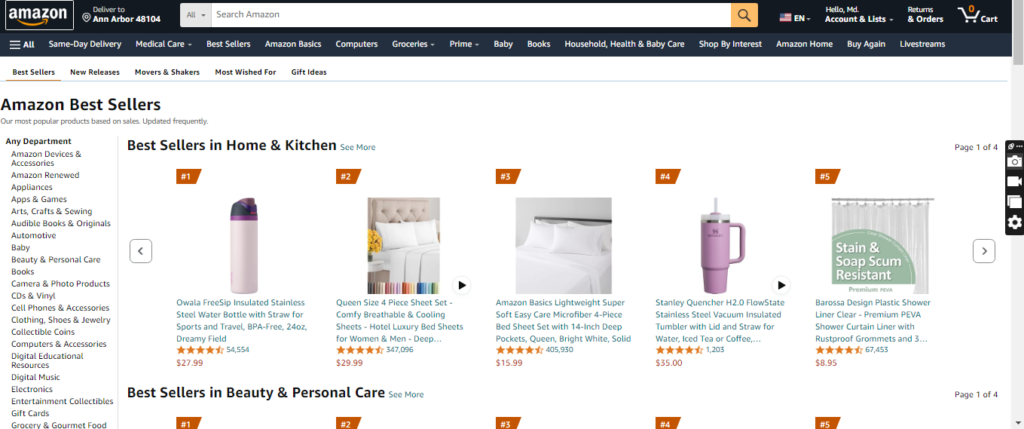
If you are still trying to choose a blog niche, the next thing you can do is search the blog niche based on product.
You can go to the sites like Amazon and check out their product. Sites like Shareashale sign up for their affiliate program and try to check out some products. Through this product, you can think of niche ideas.
Think about more than just physical products. Sites like Clickbank and Digistore24 focus on digital products. There are so many categories here that could be potential niches. You may be interested in promoting some of the products.
Start a blog around the niche of that product.
Digital products and online courses you have attended can be a potential niche.
You can also visit sites like Udemy & check out their famous courses. Hover in the categories. You will find some subcategories. From here, you can also find your niche ideas.
Method Five: Sites on Sale
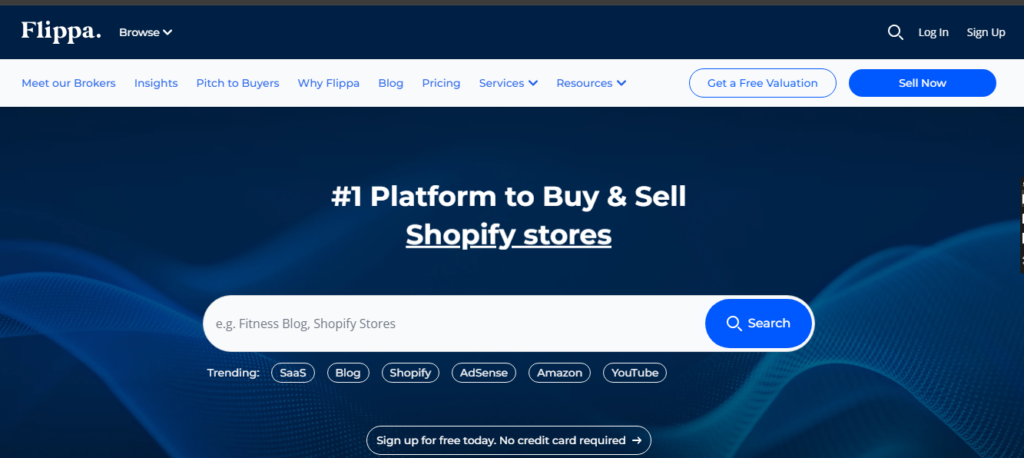
Another excellent way to find niches is to look at sites that are on sale. Go to sites like Flippa or Empire Flippers, browse their marketplace, and check out the niches and their revenue. Each of these sites on sale is profitable.
Method Six: Use Site aggregators
If you are still confused about picking the right niche for your blog, Click this Blog Directory link to find a profitable blog niche.
When you google “sites in the weight training niche,” you will usually see results from Feedspot. If you visit the link I mentioned above and scroll through it, you will find thousands of blog categories.
Step two: Niche validation (I have to create a niche validation checklist )
Before finalizing your niche, use a niche validation checklist to ensure your idea meets the criteria for profitability. Consider factors like search volume, competition level, and whether the niche offers monetization opportunities through affiliate marketing, ads, or digital products.
My niche validation checklist is available here.
Picture (niche validation checklist)
The number of rows will be determined by the number of niche ideas you have.
The second column determines if there is a search volume in your niche.
The third column determines if the niche is profitable.
The fourth column checks if there is a chance for new sites to rank.
The Last column is to put your niche through a YMYL check.
These are the elements of a profitable niche.
If they pass it, you must pay a tick through this check. Otherwise, put a cross.
If you do this test properly, at the end of it, you will probably figure out which niches are the best for starting a Blog.
So, let’s start with the first test!
Niche Idea Validation #1
Search Volume Test
In this test, you must identify if your niche has enough search volume. You can use free tools like Ahrefs keyword generator to find the search volume. Here, you will see the search volume.
You can use my hack here. When you find content-heavy sites with high search volume and specific to a micro niche, you can assure yourself that that niche has enough search volume.
You can put the checkmark in the search volume column. Let me give you an example. I bought a yacht two years ago and want to start a blog about yachts. Google search for the best yacht blogs.
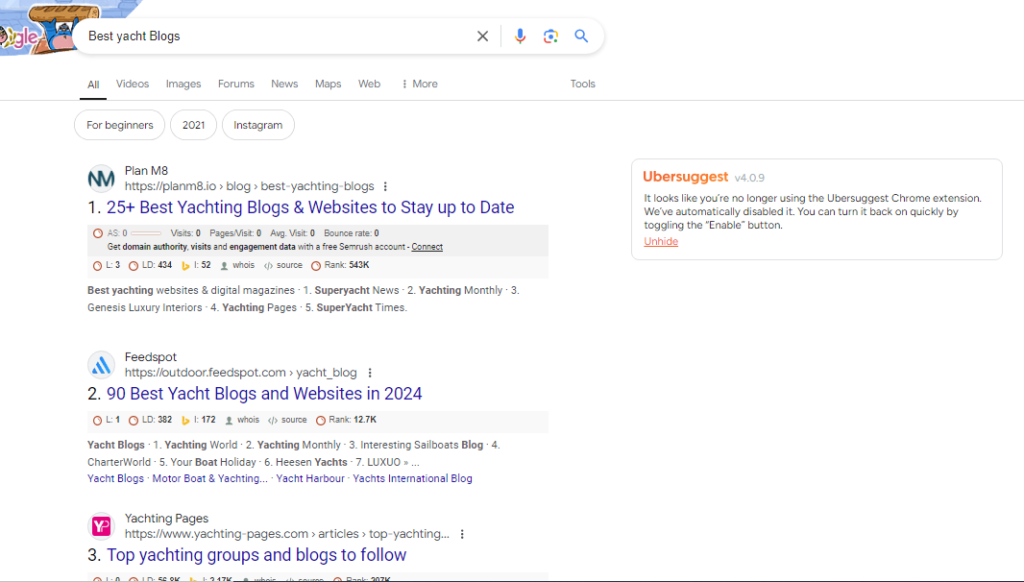
You will see many recommended blogs. Next, you have to visit each of these recommended blogs. When you browse through the site, click on several articles. Make sure it is a content-heavy site or not.
To ensure search volume, Copy the site’s domain and paste it to SimilarWeb, a free tool to check the monthly visits. You can also use any other tool that you are familiar with. Hit a search.
Do the same process again & again.
If you find 5 to 10 sites that are content-heavy, have high search volume, and are specific to your micro-niche, they deserve a spot in the search volume column.
There are too many tools to check the search volume; you can use some of them. Use one or two tools to check the Search volume.
Niche Idea Validation #2
Profitability Test
We need to know what revenue-generating sites earn to profit from our blog. ………
How do blogs make Money
- Advertising
- Affiliate Marketing
- Selling Digital Products
- Selling Physical Products
- Sponsored Content and Brand Partnerships
- Offering Services
- Memberships and Subscriptions
You have to find out if a niche is profitable. There should be many products you can promote in that niche. It is a low-profit niche if you find products unavailable in that niche.
A small discussion on how blogs make Money.
If most of the sites are monetized with ads and affiliates, it indicates that the niche is profitable.
Read More>>> How does a blog make Money?
Niche Idea Validation #3
Competition Test
We already discovered the search volume and profitability. It’s time to see if you have the potential to enter the niche as a beginner.
To do that, you first have to install an extension called Ubersuggest.
Then, open up a browser with Google Trends. Here, we will analyze the probable topics.
Start thinking of as many blog topics as possible specific to your micro niche.
For example, in the yacht niche, there are topics like
Probable niche topics
(yacht niche)
- how to maintain a yacht
- Yacht maintenance checklist
- Finishing in a kayak
- What to do in a yacht
- Are yachts a good investment
- Luxury yacht brands, etc.
When you find such keywords, go to Google Trends and paste these keywords. You will see data here, and you can guess from here whether the niche is profitable or not.
Any keywords with 100 searches will pass this test.
If you want to know if you can rank for these keywords, put them in Google. Remember to pin the Ubarsuggest Chrome extension.
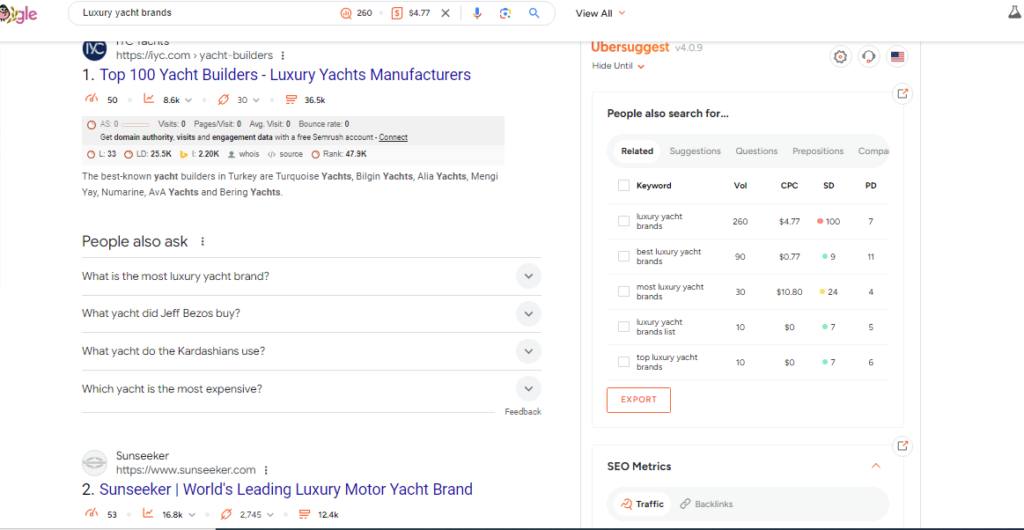
When you scroll through the suggestions, if you see the sites are not filled with more than 50 domain authorities, they can rank on Google. If they have at most 50 domain authorities, they need help to rank on that topic.
If you see low authority sites & forum sites like Quora & Reddit, it also passes the test.
On the other hand, if you see Hogh authority sites with government sites, those keywords do not pass the check.
Niche Idea Validation #4
YMYL Topics
YMYL stands for “Your Money or Your Life.” These topics can significantly impact a person’s financial stability, well-being, or overall quality of life.
Google holds YMYL content to a higher standard than other types of content because inaccurate or misleading information can have serious consequences.
As bloggers, we generally do not want to work in niches where most topics are categorized as YMYL.
Common YMYL Topics
These topics need a professional to answer the question. You don’t want to see unqualified people writing advice about drinking water or baby health care. Possible YMYL Topics are
To Understand YMYL topics, check out point 2.3 in the search quality evaluator guidelines.
So, there is no such thing as a YMYL niche. But there are YMYL topics. You should not enter a niche where most of the issues are YMYL-related, such as a medical advice blog.
Read Section 2.3 to learn about YMYL Topics: General Guidelines
Read More>> Reasons to Avoid YMYL Topics
Final Thoughts: How to Choose a Profitable Blog Niche in 2024
Choosing the right and most profitable blog niche is the foundation of your blogging success in 2024.
By following these 21 proven methods, you’ll be well on your way to finding a niche that interests you and has the potential to generate significant income.
Take action today and start your research. Happy blogging!
Choosing a blog niche might seem overwhelming, but with the right strategies, you can find a niche that combines your passion with profitability. Use these 21 proven methods to guide your search, and you’ll be on the path to creating a successful blog.
Good luck!
Now that you know how to find a profitable blog niche, it’s time to take action. Start your research today, and you’ll be on your way to creating a blog that engages your audience and helps you make Money in 2024!





